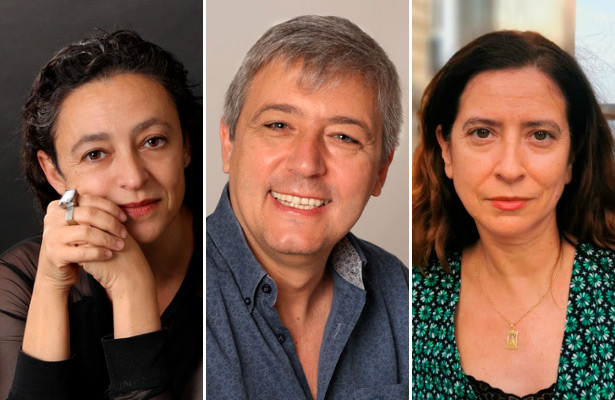Where?
The VI Internacional Pedagogical Conference will take place in Madrid, in the locations of Casa Árabe and in the context of Escuela de Escritores 20th anniversary.
How much?
The fee for general public is 125€. We offer special discounts for EACWP & NAWE members (90€), for students (75€) and EdE students (45€). Please enroll before 3rd May.
Meruane, Sagarna and Merino
Our guest lecturer, the Chilean writer of Italian and Palestinian heritage, Lina Meruane will talk about Writing in Tongues: Notes on Displacement. In addition to the programme, Ana Merino (University of Iowa) will close the conference with her reading on Multi-Workshops and Creativity while Javier Sagarna, director of Escuela de Escritores, will inaugurate the conference with his intervention about Serious Dreams over the opening session.

PANEL DISCUSSION | Friday 5, 12.45 to 13.45
Approaches to Creative Writing in America & Europe
A pedagogical dialogue between two continents
With Ana Merino (Iowa University, USA), Alain André (Aleph-Écriture, France), Mara Pastor (Sagrado Corazón University, Puerto Rico) and Conceição Garcia (Escrever, escrever, Portugal). Moderator: Mariana Torres (Escuela de Escritores, Brazil/Spain).
Is there an intrinsically European or an inherently American way of approaching the CW teaching? If, so, what would characterise both approaches and what would make them different? Additionally, are there similarities and common grounds in the CW teaching between the two continents? What may we learn from each other? How international cooperation may help us to build pedagogical bridges in order to enhance and strengthen our practices on one side of the world and the other?
PANEL DISCUSSION | Friday 5, 12.45 to 13.45
Teaching Poetry
In the 21th century
With María Gómez Lara (Escuela de Escritores, Colombia), Orhan Kipkak (vienna poetry school, Austria), Andrea Holland (East Anglia University, UK) and Lorena Briedis (Escuela de Escritores, Latvia/Spain).
Moderator: Daniel Montoya (Escuela de Escritores, Colombia).
Poetry is, perhaps, one of the most ancient expressions in all worldwide literary traditions. Which are the timeless and everlasting fundamentals of poetry? What do we talk about when we talk about poetry? And about poetics? What are the main challenges of poetry teaching in the 21th century? Now a days, what’s the role of poetry in other literary disciplines (narrative, screen writing, journalism…)? What’s the role of new technologies in poetry teaching (multimedia, transarts, performances, sound poetry…)?
PANEL DISCUSSION | Saturday 6, 10.00 to 11.00
Creative Writing Programmes in Europe
Present and future
With Frank Tazelaar (ArtEZ, The Netherlands), Martino Gozzi (Scuola Holden, Italy), Javier Sagarna (Escuela de Escritores, Spain) and Najda Sennewald (Berlin University, Germany).
Moderator: Elena Traina (Falmouth University, Italy/UK).
In this round table, representatives from different schools and universities around Europe will talk and reflect about their different master programs (its strengths, its major values and current gaps and needs) and will discuss the possibility of a multilateral program in the context of both European and international cooperation.
PANEL DISCUSSION | Saturday 6, 10.00 to 11.00
Creativity in times of crisis
With Fritz Ostermeyer (vienna poetry school, Austria), Lucian Georgescu (UNATC, Romania), Endre Lund Eriksen (Norewegian Institut for Children’s Books, Norway), An Leenders (Creatief Schrijve, Belgium), Laia Fábregas (Laboratori de Lletres, Spain). Moderator: Simone Fenoil (Scuola Holden, Italy).
In times of crisis –probably, the only possible times–, writers can make creativity a permanent way of living as artists by continuously questioning, developing and reformulating our craft. How writers re-dimension the sense and the experiences of crisis to enhance their creativity and artistic vision? What role can we play, creatively speaking, in facing the main problems of our times (climate change, war, energy rationing, immigration, political extremisms, etc.)? What are the challenges of censorship and self-censorship? What about social responsibility?
60 MIN WORKSHOP | Friday 5, 12:45 to 13:45
Writing without outlines
With Laia Fàbregas (Laboratori de Lletres, Spain).
This workshop is about writing without a known intention, writing from intuition, how a whole novel can be written without having thought about all the narrative elements beforehand. And how we can guide our intuitive students without shaping them into structured writers.
Some writers need an outline, a plot, a conflict, and character profiles before actually writing scenes for a novel. But not all writers work the same way. Some of us can’t think about outlines or characters, can’t think about a conflict or a plot before starting the writing process. We are not so structured, we are not planners, we need to start writing in order to discover what our story is about. We work from intuition, and we employ our knowledge about outlines, plots, conflicts, or character profiles once we have some words on our screen. We work from the material we write, and we look there to find the answers other writers find beforehand in their minds.
60 MIN WORKSHOP | Friday 5, 12:45 to 13:45
Pedagogic Puzzles
Harnessing the Thrill of Dopamine in the Creative Writing Classroom
With Barbara Cooke and Kerry Featherstone (Loughborough University, UK). In this workshop, we will experience how the ‘dopamine hit’ that accompanies the solving of literary puzzles can be harnessed for use in creative writing pedagogy.
While an established part of literary criticism since Kermode’s ‘Freud’s Masterplot’, the technical skill involved in creating, as opposed to observing, the building and thwarting of readerly satisfaction has been relatively undervalued. We will explore how workshop exercises can be structured to both encourage writers to provoke the “moment of relief, ease, joy, and confidence commonly referred to as Aha!-moment” (Bhattacharya, Windischberger et al, 2018) and to reinforce their own puzzle-solving through ludic teaching.


